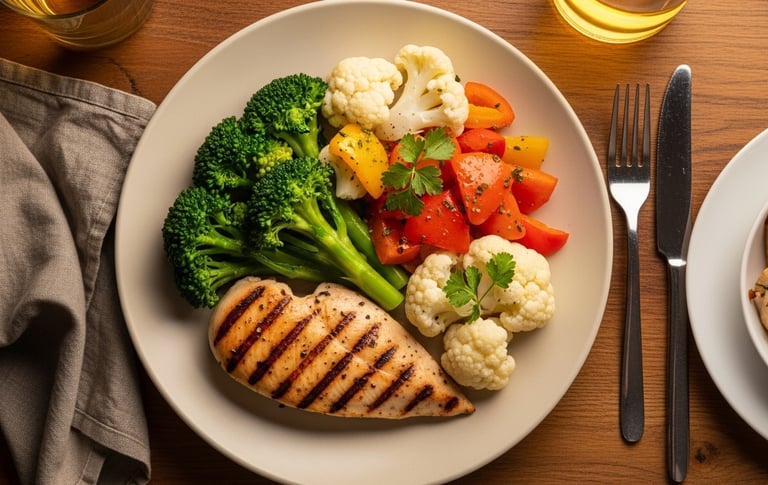5 Diet Tweaks to Stay Asleep Naturally
Struggling to stay asleep? Discover five simple, science-backed diet tweaks that can help you align with your body's natural rhythms. From magnesium-rich snacks to effective caffeine-curbing strategies, learn how to calm your system and balance nighttime hormones for a refreshing night's sleep.
WELLNESS
5/22/20253 min read


A dark bedroom, meditation apps, pricey pillows—sometimes even the best sleep hygiene tricks fall short because the real culprit is what (and when) we eat. Food affects everything from the brain’s production of sleep‑inducing hormones to blood‑sugar swings that trigger 3 a.m. wake‑ups. Try these five nutrition shifts to help your body slip into—and stay in—its most restorative stages of sleep.
1. Close the Caffeine Window by 2 p.m
Caffeine’s half‑life—how long it takes your body to clear half of it—sits around six hours. That means a 3 p.m. latte can leave a third of its stimulant load circulating at 9 p.m. If you need an afternoon pick‑me‑up, switch to decaf or an herbal tea and add a brisk walk or stretch break for a natural energy boost.
Try this: Swap your usual 3 p.m. coffee for a cinnamon‑spiked rooibos tea. Rooibos is nnaturally caffeine‑free, and cinnamon keeps blood sugar steady to avoid an evening crash.
2. Go “Slow Carb” at Dinner
Caffeine’s half‑life—how long it takes your body to clear half of it—sits around six hours. That means a 3 p.m. latte can leave a third of its stimulant load circulating at 9 p.m. If you need an afternoon pick‑me‑up, switch to decaf or an herbal tea and add a brisk walk or stretch break for a natural energy boost.
Dinner idea: Baked salmon over a quinoa–spinach salad tossed with olive oil and toasted pumpkin seeds.
3. Build a Magnesium‑Rich Bedtime Snack
Magnesium helps relax muscle and nerve tissue while supporting GABA, a calming neurotransmitter. If you tend to feel peckish close to bedtime, skip the sugary cereal and aim for 100–150 calories of magnesium‑forward foods about an hour before lights out.
A small banana with a tablespoon of almond butter
Kiwi slices sprinkled with chia seeds
Greek yogurt topped with cacao nibs
Each option serves fiber, a touch of protein, and roughly 10 percent of your daily magnesium needs—enough to soothe, not stuff, your stomach.
4. Tame Night‑Time Thirst—Without Over‑Hydrating
Magnesium helps relax muscle and nerve tissue while supporting GABA, a calming neurotransmitter. If you tend to feel peckish close to bedtime, skip the sugary cereal and aim for 100–150 calories of magnesium‑forward foods about an hour before lights out.
A small banana with a tablespoon of almond butter
Kiwi slices sprinkled with chia seeds
Greek yogurt topped with cacao nibs
Each option serves fiber, a touch of protein, and roughly 10 percent of your daily magnesium needs—enough to soothe, not stuff, your stomach.
5. Mind the Alcohol “Nightcap” Myth
Alcohol’s initial drowsiness masks the reality: it disrupts REM and deep sleep, spiking cortisol as your body metabolizes the booze. If you love a ritual drink, switch to a mocktail with sleep‑friendly ingredients.
Sparkling water + tart cherry juice (a natural source of melatonin)
Non‑alcoholic gin with rosemary and cucumber slices
Warm “golden milk” made with unsweetened almond milk, turmeric, and a dash of honey
You’ll keep the unwinding ritual without sacrificing sleep architecture.
Putting It All Together
2 p.m. cutoff for caffeine
Complex‑carb dinners with protein & healthy fats
Magnesium mini‑snack an hour before bed
Front‑load hydration, taper after dinner
Swap nightcaps for melatonin‑friendly mocktails
Try one tweak at a time for a week, then layer in the next. Within a month, you’ll have a personalized sleep‑friendly eating routine—and mornings that feel refreshing.
Disclaimer: This article offers general nutrition advice and is not a substitute for professional medical guidance. If you have chronic sleep issues or medical conditions, consult your healthcare provider.




